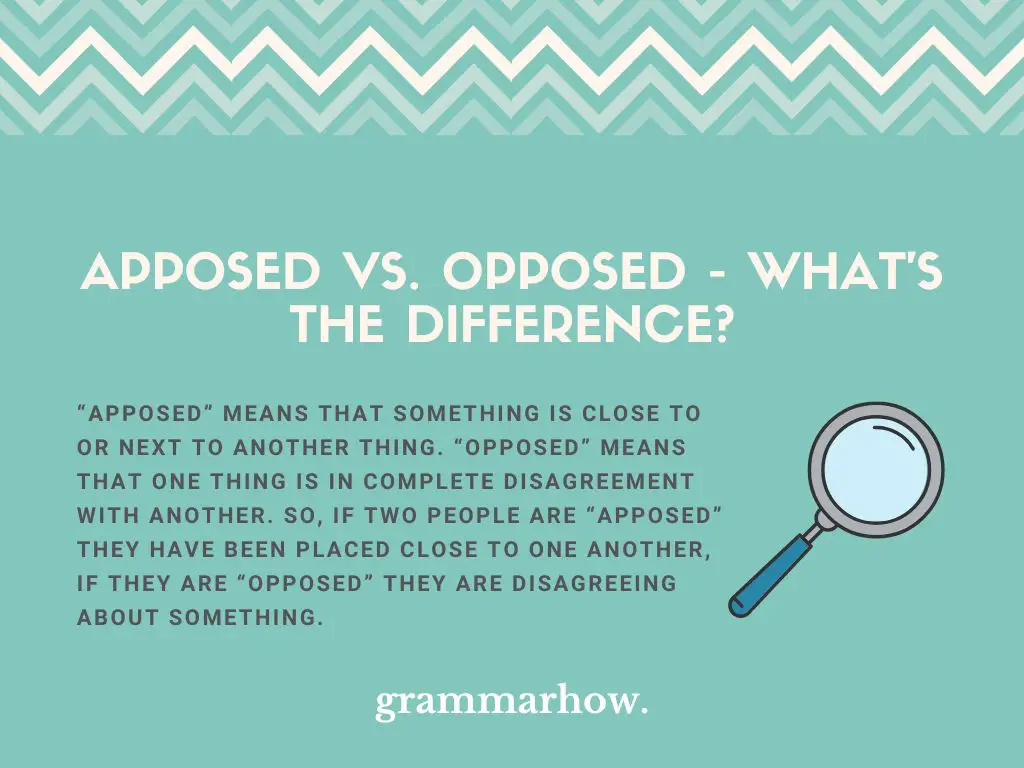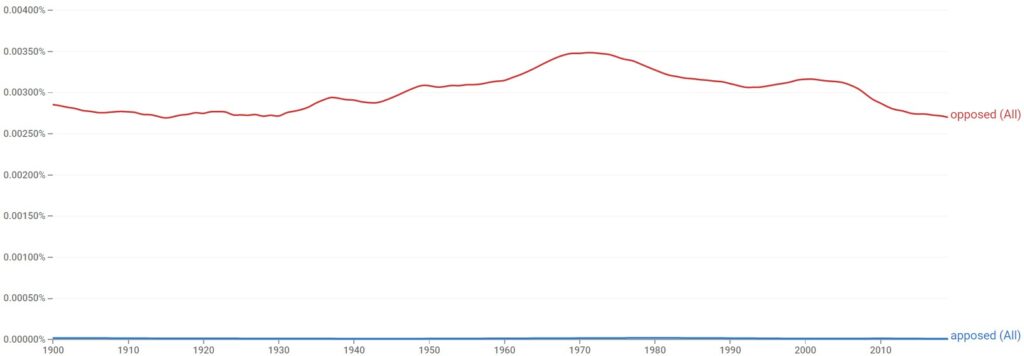Apposed or opposed? Two words with just a letter’s difference between them. So do they mean the same thing, or, at least, a similar thing?
We’ll explain exactly what they mean throughout the course of this article. So please keep reading, unless you’re strongly opposed, that is.
Apposed vs. Opposed – What’s the Difference?
“Apposed” means that something is close to or next to another thing. “Opposed” means that one thing is in complete disagreement with another. So, if two people are “apposed” they have been placed close to one another, if they are “opposed” they are disagreeing about something.

“Apposed” is not a common word and is only used to represent the literal, physical proximity of objects. It isn’t a term used to indicate emotional closeness between two people, for example. It’s most often found in scientific texts.
You cannot use “apposed” in place of “opposed”, nor the other way round.
As Opposed To or As Apposed To?
The correct term is “as opposed to” when you are illustrating the difference between two things.
Here is an example:
- Correct: Red is a fierce color, as opposed to blue, which is quite calming.
The phrase “as opposed to” is drawing a comparison between the two colors and discussing them in relation to one another.
- Incorrect: Red is a fierce color, as apposed to blue, which is quite calming.
“Apposed” means that two things have been physically placed next to one another. So, what you’re essentially saying above is:
- Red is a fierce color, as placed next to blue, which is quite calming.
This is not highlighting the contrast between the characteristics of the colors in the way the writer intends to. It is instead indicating that red appears to be a fierce color when it’s placed next to blue.
So, you could say:
- She had apposed the blue paint next to the red paint on the wall, so as to properly examine the opposition between them.
Here, the sentence is saying that red and blue naturally contain characteristics that oppose one another, while also letting you know that they’re currently apposed to each other.
Apposed is also a really uncommon word and isn’t generally found outside of academic, scientific texts. As such, it’s likely that people will see it and think you’ve just spelled opposed wrong, even if you are using it to mean the right thing!
“As opposed to” can also be used to mean “rather than”.
- I’d prefer the 11 am slot as opposed to the 9 am.
Apposed
When two things are apposed, it means they are physically near one another.
The Cambridge Dictionary defines it as “to place something next to or close to something else”. It also notes that this is a formal term, i.e., not one you’re likely to encounter in day-to-day language.
Merriam-Webster actually lists two definitions for the word:
- Archaic: to put before: apply (one thing) to another
- To place in juxtaposition or proximity
Archaic means that this definition is no longer being used.
Even with its current meaning, apposed isn’t used particularly often. It most commonly appears in academic writing.
Here are some examples of how you could use it in a sentence:
- He placed the red mug on the counter, apposed to the blue mug.
- The two strangers sat apposed at the bus stop, lives intersecting for a brief moment.
- For this experiment to work, we need these eggs to be apposed to each other at all times.
- Apposed to each other, the two paintings looked strikingly different.
Opposed
When two things are opposed, it means that they differ greatly from one another.
The Cambridge Dictionary defines it as “completely different”.
It also notes that a further definition is to “disagree with a principal or plan”, e.g:
- She’s opposed to any changes in the egg experiment.
And that the phrase “as opposed to” can be used to mean “rather than”.
- I’d cancel my egg experiment as opposed to altering it one bit!
The difference that “oppose” is referring to can be anything, whether it’s a difference in physical appearance or a matter of opinion.
Here are some examples of how you can use it in a sentence:
- Her friends were highly opposed to her getting back with her ex.
- Their previous dark brown hair opposed these new bleach blonde locks.
- The left-wing and right-wing of the party are opposed.
- My parents are getting a divorce; they’re just always opposed to each other these days.
Which Is Used the Most?
Opposed is used the most by far and always has been.
If you just take a look at the Google Ngram Viewer you can see that “apposed” has basically stayed in a flat line right near the bottom all the way from 1900 to today.

Opposed is soaring miles ahead in the sky. Not only is it unthreatened by “apposed”, but there’s also a solid chance it’s not even aware “apposed” exists. It’s too far away. It just can’t see it.
Final Thoughts
If you see “apposed” being used in place of “opposed”, this is incorrect. “Apposed” means that two things are physically close to or next to each other. “Opposed” means that two things differ greatly from one another or are in disagreement – it bears no relation to distance.

Martin holds a Master’s degree in Finance and International Business. He has six years of experience in professional communication with clients, executives, and colleagues. Furthermore, he has teaching experience from Aarhus University. Martin has been featured as an expert in communication and teaching on Forbes and Shopify. Read more about Martin here.
